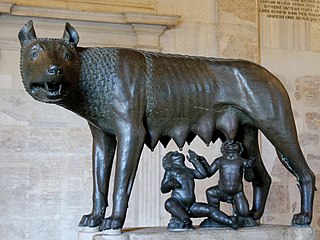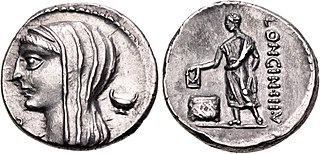Related Research Articles

The patricians were originally a group of ruling class families in ancient Rome. The distinction was highly significant in the Roman Kingdom and the early Republic, but its relevance waned after the Conflict of the Orders. By the time of the late Republic and Empire, membership in the patriciate was of only nominal significance. The social structure of ancient Rome revolved around the distinction between the patricians and the plebeians. The status of patricians gave them more political power than the plebeians, but the relationship between the groups eventually caused the Conflict of the Orders. This time period resulted in changing of the social structure of ancient Rome.

In ancient Rome, the plebeians or plebs were the general body of free Roman citizens who were not patricians, as determined by the census, or in other words "commoners". Both classes were hereditary.

Gaius Sempronius Gracchus was a reformist Roman politician and soldier who lived during the 2nd century BC. He is most famous for his tribunate for the years 123 and 122 BC, in which he proposed a wide set of laws, including laws to establish colonies outside of Italy, engage in further land reform, reform the judicial system and system for provincial assignments, and create a subsidised grain supply for Rome.

The gens Cassia was a Roman family of great antiquity. The earliest members of this gens appearing in history may have been patrician, but all those appearing in later times were plebeians. The first of the Cassii to obtain the consulship was Spurius Cassius Vecellinus, in 502 BC. He proposed the first agrarian law, for which he was charged with aspiring to make himself king, and put to death by the patrician nobility. The Cassii were amongst the most prominent families of the later Republic, and they frequently held high office, lasting well into imperial times. Among their namesakes are the Via Cassia, the road to Arretium, and the village of Cassianum Hirpinum, originally an estate belonging to one of this family in the country of the Hirpini.

The Conflict of the Orders, also Struggle of the Orders, was a political struggle between the plebeians (commoners) and patricians (aristocrats) of the ancient Roman Republic lasting from 500 BC to 287 BC in which the plebeians sought political equality with the patricians. It played a major role in the development of the Constitution of the Roman Republic. Shortly after the founding of the Republic, this conflict led to a secession from Rome by the Plebeians to the Sacred Mount at a time of war. The result of this first secession was the creation of the office of plebeian tribune, and with it the first acquisition of real power by the plebeians.

The Concilium Plebis was the principal assembly of the common people of the ancient Roman Republic. It functioned as a legislative/judicial assembly, through which the plebeians (commoners) could pass legislation, elect plebeian tribunes and plebeian aediles, and try judicial cases. The Plebeian Council was originally organized on the basis of the Curia but in 471 BC adopted an organizational system based on residential districts or tribes. The Plebeian Council usually met in the well of the Comitium and could only be convoked by the tribune of the plebs. The patricians were excluded from the Council.

The Curiate Assembly was the principal assembly that evolved in shape and form over the course of the Roman Kingdom until the Comitia Centuriata organized by Servius Tullius. During these first decades, the people of Rome were organized into thirty units called "Curiae". The Curiae were ethnic in nature, and thus were organized on the basis of the early Roman family, or, more specifically, on the basis of the thirty original patrician (aristocratic) clans. The Curiae formed an assembly for legislative, electoral, and judicial purposes. The Curiate Assembly passed laws, elected Consuls, and tried judicial cases. Consuls always presided over the assembly. While plebeians (commoners) could participate in this assembly, only the patricians could vote.
The lex Hortensia, also sometimes referred to as the Hortensian law, was a law passed in Ancient Rome in 287 BC which made all resolutions passed by the Plebeian Council, known as plebiscita, binding on all citizens. It was passed by the dictator Quintus Hortensius in a compromise to bring the plebeians back from their secession to the Janiculum.
The Licino-Sextian rogations were a series of laws proposed by tribunes of the plebs, Gaius Licinius Stolo and Lucius Sextius Lateranus, enacted around 367 BC. Livy calls them rogatio – though he does refer to them at times as lex – as the plebeian assembly did not at the time have the power to enact leges (laws).
Gaius Manilius was a Roman tribune of the plebs in 66 BC. He is primarily known for his Lex Manilia, the bill which gave Pompey the Great command of the war against Mithridates.
Lex Voconia was a law established in ancient Rome in 169 BC.
The Lex Oppia was a law established in ancient Rome in 215 BC, at the height of the Second Punic War during the days of national catastrophe after the Battle of Cannae, and repealed in 195 BC.
The lex Calpurnia de repetundis was a Roman law sponsored in 149 BC by the tribune of the plebs Lucius Calpurnius Piso. It established the first permanent criminal court in Roman history, in order to deal with the growing number of crimes committed by Roman governors in the provinces. The lex Calpurnia was a milestone in both Roman law and politics.
The Valerian and Porcian laws were Roman laws passed between 509 BC and 184 BC. They exempted Roman citizens from degrading and shameful forms of punishment, such as whipping, scourging, or crucifixion. They also established certain rights for Roman citizens, including provocatio, the right to appeal to the tribunes of the plebs. The Valerian law also made it legal to kill any citizen who was plotting to establish a tyranny. This clause was used several times, the most important of which was its usage by Julius Caesar's assassins.
A fideicommissum is a type of bequest in which the beneficiary is encumbered to convey parts of the decedent's estate to someone else. For example, if a father leaves the family house to his firstborn, on condition that they will bequeath it to their first child. It was one of the most popular legal institutions in ancient Roman law for several centuries. The word is a conjunction of the Latin words fides (trust) and committere, and thus denotes that something is committed to one's trust.

The Tribal Assembly was an assembly consisting of all Roman citizens convened by tribes (tribus).

The lex Publilia, also known as the Publilian Rogation, was a law traditionally passed in 471 BC, transferring the election of the tribunes of the plebs to the comitia tributa, thereby freeing their election from the direct influence of the Senate and patrician magistrates.
The daughters' quarter, also known as filial quarter, was the legal doctrine that regulated the right of a Hungarian nobleman's daughter to inherit her father's property.

Gaius Antius Restio was a politician of the Roman Republic. He is principally known for the lex Antia sumptuaria, a law against luxury he passed as tribune of the plebs in 68 BC. This law forbade magistrates from attending banquets, in an attempt to contain political corruption. One of the few sources on Restio's life is a poem of his contemporary Catullus, telling that he was an enemy of Publius Sestius, a politician and good friend of Cicero.
Inheritance law in ancient Rome was the Roman law that governed the inheritance of property. This law was governed by the civil law of the Twelve Tables and the laws passed by the Roman assemblies, which tended to be very strict, and law of the praetor, which was often more flexible. The resulting system was extremely complicated and was one of the central concerns of the whole legal system. Discussion of the laws of inheritance take up eleven of the fifty books in the Digest. 60-70% of all Roman litigation was concerned with inheritance.
References
- Johnston, David (2015). "Succession". In Johnston, David (ed.). The Cambridge Companion to Roman Law. Cambridge University Press. pp. 199–212. doi:10.1017/CCO9781139034401. ISBN 978-0-521-89564-4.
 This article incorporates text from a publication now in the public domain : Donne, William Bodham (1870). "Falcidius, P.". In Smith, William (ed.). Dictionary of Greek and Roman Biography and Mythology . Vol. 2. p. 133.
This article incorporates text from a publication now in the public domain : Donne, William Bodham (1870). "Falcidius, P.". In Smith, William (ed.). Dictionary of Greek and Roman Biography and Mythology . Vol. 2. p. 133.